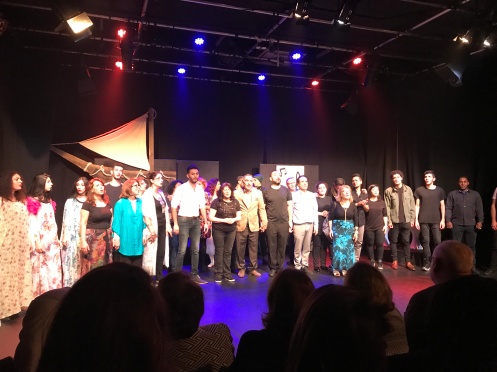
We’re running some 15 minutes late, which I hate in general but especially when heading to the theatre. I tell myself, if we arrive and the show has started, then we can just go out for dinner instead. Walking into Chelsea Theatre, we approach a small desk, where some three assistants flick through papers looking for our reserved tickets. They don’t find anything. A woman writes down my name, and a man hurriedly ushers us in. We walk into a packed auditorium. I cannot see any empty spaces, except next to an elderly man a few rows from the front, who had placed his coat next to him, in an attempt to reserve the place. He sees me, politely clears the seat with a shrug of resignation. I look at my husband, then the usher, ‘we’ll find him a place, don’t worry!’ I apologise to the man as I sit in his friend’s seat, whilst watching to see where my husband will be squeezed in. They seat him at the end of a row on the other side of the auditorium, between a very young woman and another elderly man. Some half dozen people walk in after us, some argue and gesticulate until they manage to allocate themselves a makeshift seat, others are more embarrassed and accept the rejection, often after a wave and smile at familiar faces, watching from the safety of their seats. By now, the show itself is nearly 45 minutes late in starting. The woman to my left informs me that it’s been this busy almost every night since the play’s run, and this is the last evening. I’m intrigued.
The lights dim, as someone crosses the stage, and pairs of eyes peek through the heavy curtains backstage. Instrumental music comes on, as a woman dressed in a ballet tutu dances onto the stage with a big grin. This must be symbolic of something, I console myself, though as the minutes march forward, I’m half filled with dread; what have I dragged us into? It’s so precious to have my husband in London, and for us to be able to find an evening to ourselves without our toddler, only to be separated then squeezed amongst unfamiliar bodies watching a grown-up woman do an impression of a ballerina?
The night before, I had read a Facebook post on a friend’s wall praising a feminist Iraqi play and recommending people to go see it. I’m all about community art and theatre, and it’s not often that I have a chance to witness an Iraqi feminist play, so I immediately followed the reservation instructions and texted my name to a listed mobile number. I’ve grown familiar with two types of ‘community theatre’, one where a group of amateur theatre makers put on a play, often a classical one, usually to the interest of locals. I imagine this more in small towns and villages, rather than big cities.Then there’s the type of community theatre that I’ve been involved in, where a performance is devised with a group of people, maybe of a disadvantaged background or/ and those of different religious, political or cultural affinities. The process of making the show engenders dialogue, and that’s really the point of the whole thing. I would not apply the same criteria to such showings as I might to a professional production, say at the Royal Court or National Theatre.
As a group of masked men approach the stage to engulf our ballerina, I wonder to which category this play belongs.
Shelving my snobbery from there on, I watch as short scenes play out to essentially demonstrate the fickleness of men, and often, the endurance and courage of women. Generally, male characters who have betrayed their wives by taking a second wife with good connections to get ahead in life, or taken a third and fourth wife, as well as a mistress to cheat the benefits system in the UK, or an academic, having divorced his learned wife in favor of an illiterate rural woman, finds she has more sense than he does. ‘Is it common to marry more than one woman in Iraq?’, my Palestinian husband asks. Not that I know of, though perhaps this is now a trend (?). A Greek chorus, composed of three young women, sang short ditties summarising the moral of each scene. Still, there was no question that with every scene, with every ditty, we were all attuned to our actors on stage.

There’s a scene between two female political candidates at a talk show, where two types of people are represented: the intellectual woman, refined in her language and manner, wearing quite ‘westernised’ clothing, juxtaposed with the more cliched Iraqi woman, wearing a jilabiyya, carrying her groceries, being bullied by her buffoon husband… the former is all about smooth talk, whilst the latter is all about action. Clever and funny, with more than a grain of truth. As each woman stated her argument, audience members cheered, commented and jeered accordingly. I imagined Brazilian theatre maker
Augusto Boal’s inspiration for
Forum Theatre, whereby members of the audience are encourage to shoutout ’stop’, only to enter a scene themselves as protagonists and attempt a different result to what the play originally showed, whilst the actors onstage improvise around each intervention. Boal named his audience members ’spectactors’, as in a cross between spectators and actors, making a move against the passivity of those watching a play. In a wider context, encouraging active and engaged citizens of the world, not those apathetic to anything that doesn’t directly impact them. This was at the heart of the play, namely, ‘we’ as Iraqis need to take responsibility for what is happening and not hide behind fatalist facades.
In any case, there was nothing passive about our Iraqi audience members, as individuals and groups spontaneously voiced their opinion, laughed and clapped to express their stance. I found these moments the most enjoyable part of the evening.
The style of the play sprints between the farcical comedic and realist tragic, which seemed so aligned to my eyes and ears that I was only made aware of the juxtaposition when my husband pointed it out. My initial response was simple, and made up, as this is not corroborated by anyone or anything I’ve read: As Iraqis, we are often sick of the daily tragedies, the realities of life, and so we often need humor to lubricate us into accepting the harder truths. And these were old school Iraqis. The first generations of the community, who may have been in the UK for ten or twenty years, but who maintain life within a diasporic bubble. Theirs is an Iraq of the past, long gone and replaced by something scary and unfamiliar. There were also Iraqis with clear, living connections to today’s Iraq, and who resonated with the actions on stage from a slightly different perspective. Whether in the UK for 3 months or 30 years, in the end, as Iraqis in diaspora, we were all part of the same subgroup, whether or not we feel we are part of the same ‘community.
For my part, I relished hearing the Iraqi dialect on stage. Not only that, but different dialects, like the illiterate rural woman pronouncing tea as ‘choy’ instead of the urbanite ‘chai’. New to me. And her intellectual husband who made statements in modern-standard Arabic, and did asides to translate each phrase into common speak. Quick, witty and uniquely Iraqi.
The play culminated in a character, so far on the periphery, who walks centerstage to address the audience. He weeps as he bemoans his fate, his losses and the death of his hopes and dreams. He weeps as he declares no choice other than to emigrate and leave his home. At this stage, I am totally with the crowd, wiping away streams of tears, because this is real. This is no longer about make-pretend characters or a Greek chorus singing a flat tune or some intellectual exercise. This is what is actually happening- and what has been happening- in Iraq for a long time, and we all empathise.
I am filled with the realisation that this is what community theatre is about; this reflection of life on stage, this interaction of audience members to what they witness, the meeting of friends and neighbors in the auditorium, as well as new meetings between people who essentially belong to the same ‘community’. Of course I wish our efforts are more organised- why the obscene overbooking and the lack of a program? I am sad that I do not know who directed this, or the names of any of the actors, or the lyricist of the ditties- and I’m also guilty of being late and expecting to have a seat regardless. All these, I realise, are peripheral, when the essence of theatre was so beautifully demonstrated with an auditorium full of spectactors ready to go on a journey via the stage.


Beautifully written and moving, as it captures the sentiments not only Iraqis but Syrians, Yemenis and of course, Palestinians enduring the tragedy of displacement.
I like that you overlay your views as actor with the emotions associated with your British-Iraqi identity.